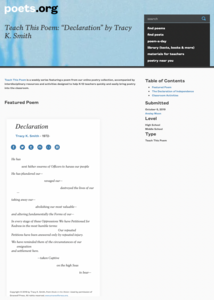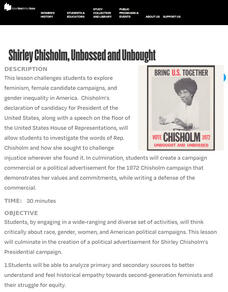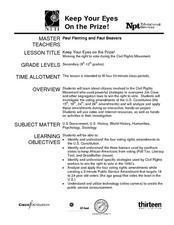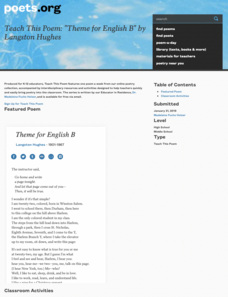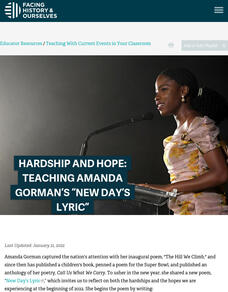C-SPAN
Presidential Candidate Firsts
Hilary Clinton may have been the first woman to run for president on a major party ticket, but she was only one example of an historic candidacy. Class members use video clips curated from C-SPAN to examine historical firsts in...
Academy of American Poets
Teach This Poem: “Declaration” by Tracy K. Smith
Tracy K. Smith's erasure poem "Declaration" challenges scholars to use their noticing skills to make connections between an engraving entitled "The Declaration of Independence" and Smith's poem. Class members record observations and...
C3 Teachers
Emancipation: Does It Matter Who Freed the Slaves?
Scholars generally agree on the emancipation of enslaved people in the United States. This inquiry-based lesson asks high schoolers to consider more than the claims of who freed the enslaved people but the significance of the issues...
Facing History and Ourselves
Why Little Things Are Big
Often our decisions are impacted by a fear of how others see us. That's the big idea in a two-day lesson that asks how false assumptions, how our fear of how others may see us, impact how we act. After watching a video about such a...
North Carolina Consortium for Middle East Studies
Journey of Reconciliation, 1947
After examining the Jim Crow laws and reading primary source materials about the 1947 Journey of Reconciliation, class members create historical markers that honor riders and their journey.
Stanford University
Civil Rights or Human Rights?
Young citizens consider the American civil rights movement as part of the global struggle for human rights. After using a timeline activity to learn about the major events in the civil rights movement, class members study Malcolm X's...
PBS
Democracy in Action: Freedom Riders
This is a must-have resource for every social studies teacher covering the civil rights movement. Through an engaging video and detailed viewing guide, young historians learn about the Freedom Riders, and discover how everyday...
Jamestown-Yorktown Foundation
What Was Everyday Life like in Colonial Virginia?
After reflecting on jobs people perform in the present day, scholars discuss what they believe jobs would have been like in Colonial Virginia during the American Revolution. Small groups then perform a jigsaw using informational packets....
Learning for Justice
Maya Angelou
Maya Angelou's poem, "Still I Rise", offers young scholars an opportunity to consider how poets use literary devices to create powerful messages. After a close reading and discussion of the poem, class members reflect on how they can...
National Endowment for the Humanities
Factory vs. Plantation in the North and South
North is to factory as South is to plantation—the perfect analogy for the economy that set up the Civil War! The first lesson in a series of five helps teach beginners why the economy creates a driving force for conflict. Analysis of...
National Woman's History Museum
Shirley Chisholm, Unbossed and Unbought
An engaging resource introduces young historians to Shirley Chisholm, the woman, the Black congresswoman, the activist, and the candidate for President in 1972. Class members study primary sources, watch a video of her announcing her run...
Crafting Freedom
The Self-Empowerment of Harriet Jacobs
In a hands-on learning activity, pupils read about and recreate the experience of Harriet Jacobs, author of one of the most famous slave narratives of all time in which she describes her years of hiding from her master in a confined...
Pearson
Langston Hughes
An author study provides learners the opportunity to explore in depth the life of, the influences on, and the works of a single literary figure. Introduce middle schoolers to Langston Hughes with a unit that models how to approach an...
Crafting Freedom
George Moses Horton: Crafting Virtual Freedom Through Poetry
What is "virtual freedom"? How about "enslaved entrepreneurship"? Class members will learn about these terms and much more as they read the poems and examine the life of George Moses Horton.
Curated OER
The Holy Land
Explore the culture, geography, and religion of Ethiopia. Learners complete a viewing guide while watching a film on Ethiopia as the first Christian country in Africa. Additionally, they create group presentations and write paragraphs...
Annenberg Foundation
Mapping Initial Encounters
Picture someone's excitement of seeing a horse for the first time. How about a cow? The Columbian Exchange changed life for not only Native Americans, but also for Europeans and the entire world. The second lesson of a 22-part series...
American Institute of Physics
Dr. Gates and the Nature of the Universe
What do Russian nesting dolls have to do with physics? They make a great demonstration tool for explaining Dr. Sylvester James Gates, Jr.'s string theory to young scientists. A two-part lesson first introduces learners to Dr. Gates' life...
EngageNY
Identifying Supporting Reasons and Evidence for an Opinion: Exploring Why Jackie Robinson Was the Right Man to Break the Color Barrier (Promises to Keep, Pages 26–29)
Breaking barriers is not an easy thing to do. Scholars read a section in Promises to Keep and summarize how Jackie Robinson broke the color barrier in baseball. They write the gist of the passage in their journals and then complete a...
Crafting Freedom
Harriet Jabocs and Elizabeth Keckly: The Material and Emotional Realities of Childhood in Slavery
Learning how to make accurate inferences by putting together facts found in multiple sources is one of those skills all learners must develop, but one that can be a challenge to teach. This resource is a must-have for your curriculum...
Crafting Freedom
Harriet Jabocs and Elizabeth Keckly: The Material and Emotional Realities of Childhood in Slavery
Through the journals written by Harriet Jacobs and Elizabeth Keckly, young readers gain insight into the lives of two enslaved children on nineteenth-century plantations.
Curated OER
Keep Your Eye On the Prize
High schoolers learn about citizens who were actively involved in the civil rights movement, and the strategies they used to overcome the Jim Crow laws that were so prevalent in the 1960s. They investigate the voting amendments of the US...
Academy of American Poets
Teach This Poem: "Theme for English B" by Langston Hughes
Langston Hughes' "Theme for English B" is featured in a lesson that asks pupils to first read a biography of Hughes and list things about his life they think are important. The class then reads the poem and compares what they learned...
PBS
Keep Your Head Up | Black America Since MLK: And Still I Rise
Change may be slow in coming, but things do change. Oprah Winfrey and Black Entertainment Television CEO, Robert L. Johnson, discuss the opportunities available to them due to the efforts of Dr. Martin Luther King, Jr. and other civil...
Facing History and Ourselves
Hardship and Hope: Teaching Amanda Gorman's "New Day's Lyric"
Class members come together to study Amanda Gorman's poem "New Day's Lyric." After a close reading of the poem, learners watch a video of Gorman reading her poem, and then craft additional lines for the poem where they offer suggestions...



